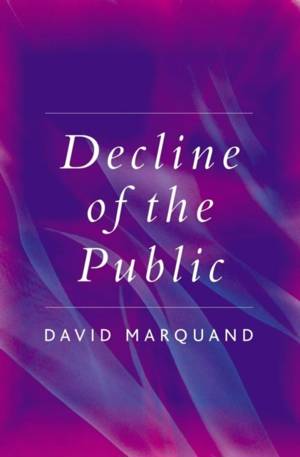
En raison d'une grêve chez bpost, votre commande pourrait être retardée. Vous avez besoin d’un livre rapidement ? Nos magasins vous accueillent à bras ouverts !
- Retrait gratuit dans votre magasin Club
- 7.000.000 titres dans notre catalogue
- Payer en toute sécurité
- Toujours un magasin près de chez vous
En raison de la grêve chez bpost, votre commande pourrait être retardée. Vous avez besoin d’un livre rapidement ? Nos magasins vous accueillent à bras ouverts !
- Retrait gratuit dans votre magasin Club
- 7.000.0000 titres dans notre catalogue
- Payer en toute sécurité
- Toujours un magasin près de chez vous
104,95 €
+ 209 points
Description
'To construct a civilization around the nostrum that the public realm is morally, economically and socially inferior to the private realm is to submit to an alien barbarism in which what we hold in common is permanently placed as second best. David Marquand has constructed a masterly and highly readable plea for the idea of the public once again to be celebrated in British life. His re-entry into the national conversation could not be better timed or more important. Let's hope our fellow citizens take arms in the battle he invites us to join.'
--Will Hutton, Columnist, Observer Newspaper
'A profound analysis of the decline of the public realm and the growth of unaccountable government in Britain. The summation of a life's work by one of Britain's leading political thinkers.'
--John Gray, The London School of Economics
The public domain of citizenship, equity and service is crucial for individual fulfilment and social well-being. But it has been under attack for thirty years - first from the market fundamentalists of the New Right, and then from their New Labour imitators. The results are everywhere - resource-starved public services; the marketization of the public sector; the soul-destroying targets and audits that go with it; the denigration of professionalism and the professional ethic; and the erosion of public trust. More damaging still are the hollowing out of citizenship, the manipulative populism that now pervades British government and a slide towards a new version of the 'Old Corruption' that our Victorian ancestors thought they had banished.
David Marquand traces the growth of the public domain from Gladstone to Attlee, analyses the forces that began to undermine it in its post-war heyday and exposes the campaign that the Thatcher and Blair governments have waged against it. He ends with a call for a counter-attack, based on a re-statement of the civic ideal in a twenty-first century idiom.
This book will appeal to all those who take an interest in current political events as well as those studying politics and social policy.
--Will Hutton, Columnist, Observer Newspaper
'A profound analysis of the decline of the public realm and the growth of unaccountable government in Britain. The summation of a life's work by one of Britain's leading political thinkers.'
--John Gray, The London School of Economics
The public domain of citizenship, equity and service is crucial for individual fulfilment and social well-being. But it has been under attack for thirty years - first from the market fundamentalists of the New Right, and then from their New Labour imitators. The results are everywhere - resource-starved public services; the marketization of the public sector; the soul-destroying targets and audits that go with it; the denigration of professionalism and the professional ethic; and the erosion of public trust. More damaging still are the hollowing out of citizenship, the manipulative populism that now pervades British government and a slide towards a new version of the 'Old Corruption' that our Victorian ancestors thought they had banished.
David Marquand traces the growth of the public domain from Gladstone to Attlee, analyses the forces that began to undermine it in its post-war heyday and exposes the campaign that the Thatcher and Blair governments have waged against it. He ends with a call for a counter-attack, based on a re-statement of the civic ideal in a twenty-first century idiom.
This book will appeal to all those who take an interest in current political events as well as those studying politics and social policy.
Spécifications
Parties prenantes
- Auteur(s) :
- Editeur:
Contenu
- Nombre de pages :
- 176
- Langue:
- Anglais
Caractéristiques
- EAN:
- 9780745629094
- Date de parution :
- 12-03-04
- Format:
- Livre relié
- Format numérique:
- Ongenaaid / garenloos gebonden
- Dimensions :
- 137 mm x 216 mm
- Poids :
- 340 g

Les avis
Nous publions uniquement les avis qui respectent les conditions requises. Consultez nos conditions pour les avis.






